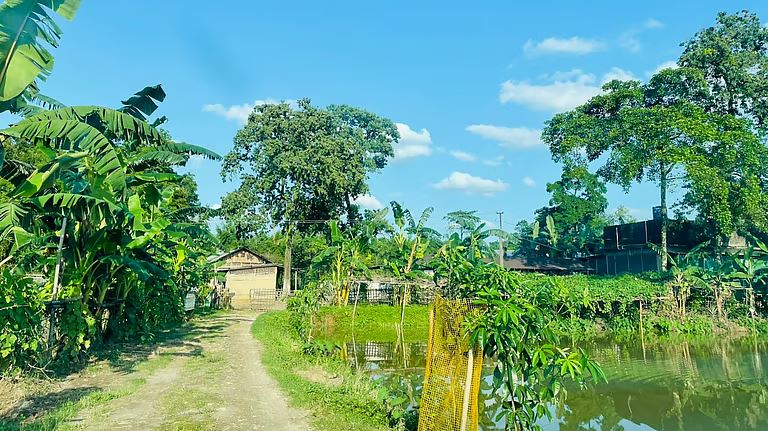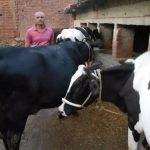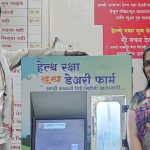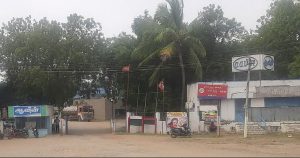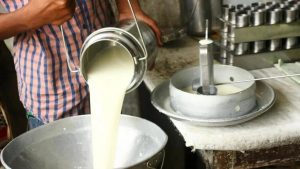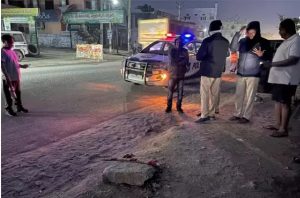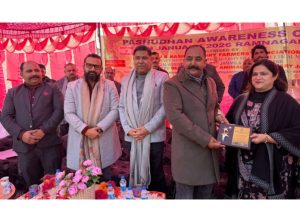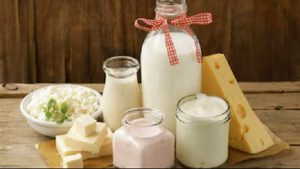
This former banker is transforming rural livelihoods as she leads a women-driven dairy cooperative, turning a personal dream into a thriving community movement, Prasanta Mazumdar documents.
ASSAM: In the quiet village of Rongajan, nestled just six kilometres from Lakhimpur town in northern Assam, a remarkable transformation is underway—led by a young woman who swapped the corporate cubicle for cow sheds and community uplift.
Banashree Hazarika, a postgraduate in banking and insurance from Rajiv Gandhi University, Arunachal Pradesh, left behind a promising banking career to chase a dream rooted in self-reliance, sustainability, and social impact. What began as a personal quest has grown into a women-led dairy movement that’s changing the lives of many in her region.
Today, Banashree is not just a successful dairy farmer—she is the face of rural entrepreneurship in Lakhimpur. Her journey, though inspiring, was not without its share of raised eyebrows, challenges, and setbacks.
“When I decided to quit my banking job and buy livestock, some people thought I was crazy,” she recalls. “But I’ve always been someone who follows through with what I start. I don’t rest until I’ve executed my plans.” Her decision was sparked by a simple, everyday inconvenience—milk scarcity in her joint family.
Even with cows at home, the supply was inadequate when the entire family gathered for tea and snacks. That recurring shortfall nudged Banashree to think bigger: “I realised this wasn’t just our problem. Our village too lacked sufficient milk supply. That’s when the idea to do something in the dairy sector took root.”
In 2020, she took her first step by setting up a small farm in her native village. She quit her job a few months later to dedicate herself fully to the new venture. With savings from her years in banking, she purchased three Jersey cows, 15 goats, along with ducks and chickens. She also constructed sheds for the animals.
But it wasn’t smooth sailing. Complaints from neighbours over the stench of cow dung forced her to move her farm to a more isolated area. She leased a 20-bigha plot and began reconstructing the farm from scratch. The land had five abandoned fisheries, which she revived, investing around Rs 6–7 lakh from her own savings.
“I had no prior experience in livestock farming, so I began visiting other farms to learn,” Banashree says. “Some people welcomed me in, others—ironically, people I knew—refused to let me in. Still, I learned what I could and kept going.”
As time passed, her livestock multiplied. Today, her farm houses 20 Jersey and Holstein Friesian cows, 40 goats, and a large number of ducks and chickens. All the calves born have been females, helping her expand her dairy operation naturally.
In a significant leap forward, Banashree established the Bogi Farmhouse Multipurpose Cooperative Society Limited in 2024, involving local women in the process. The cooperative sells not only milk, but also milk products like milkshakes, lassi, and ice cream. The farm yields around 110–120 litres of milk daily, which is sold through the society.

“I noticed that many women in Rongajan village were struggling to sell the small quantities of milk produced by their cows—sometimes just 2–3 litres. I thought a cooperative would help us all,” Banashree explains. “I approached them and they readily agreed. Today, 15–20 women sell their milk through the society and earn better than before.”
Her efforts drew attention when a local YouTube channel featured her story. The coverage reached the then district magistrate Sumit Sattawan and local MLA Manab Deka. They supported her initiative by allotting land for a dedicated milk parlour under the cooperative.
Today, the milk parlour serves as a hub where locals can buy fresh milk and products—or opt for home delivery. What once caused wastage and losses due to heat or unsold inventory is now a structured and thriving supply chain.
She’s also branched out further. A café run by Banashree sources milk from the parlour. The goats at her farm aren’t raised for meat, but sold for rearing to trusted buyers. Fish from her revived fisheries attract traders from nearby areas.
Currently, Banashree employs 10 people to manage operations across her farm, parlour, and café. “None of this would’ve been possible without my family’s support,” she says. “Not once did they protest my decision to quit a bank job.”
She admits that her decision was met with ridicule in the beginning. “A couple of women even mocked me, saying I had become a ‘cowgirl.’ But I wasn’t deterred. I stayed focused.”
For Banashree, entrepreneurship was never just about profit—it was about proving that self-employment can be just as dignified and rewarding as a government job. “We always run after government jobs, but you can earn a decent living through entrepreneurship too. There’s risk, yes, but also immense satisfaction,” she says.
Her impact has gone beyond economics. Banashree is frequently invited to speak at public events, including Women’s Day functions, to inspire others with her story.
Her efforts have also earned recognition from the Indian Council of Agricultural Research, which awarded her for innovation and leadership in rural entrepreneurship.
Banashree’s journey stands as a testament to the power of individual vision combined with community spirit. In a region where young people often migrate for jobs, she chose to stay, build, and bring others along with her. And in doing so, she has redefined what success looks like.
You can now read the most important #news on #eDairyNews #Whatsapp channels!!!
🇮🇳 eDairy News ÍNDIA: https://whatsapp.com/channel/0029VaPidCcGpLHImBQk6x1F
